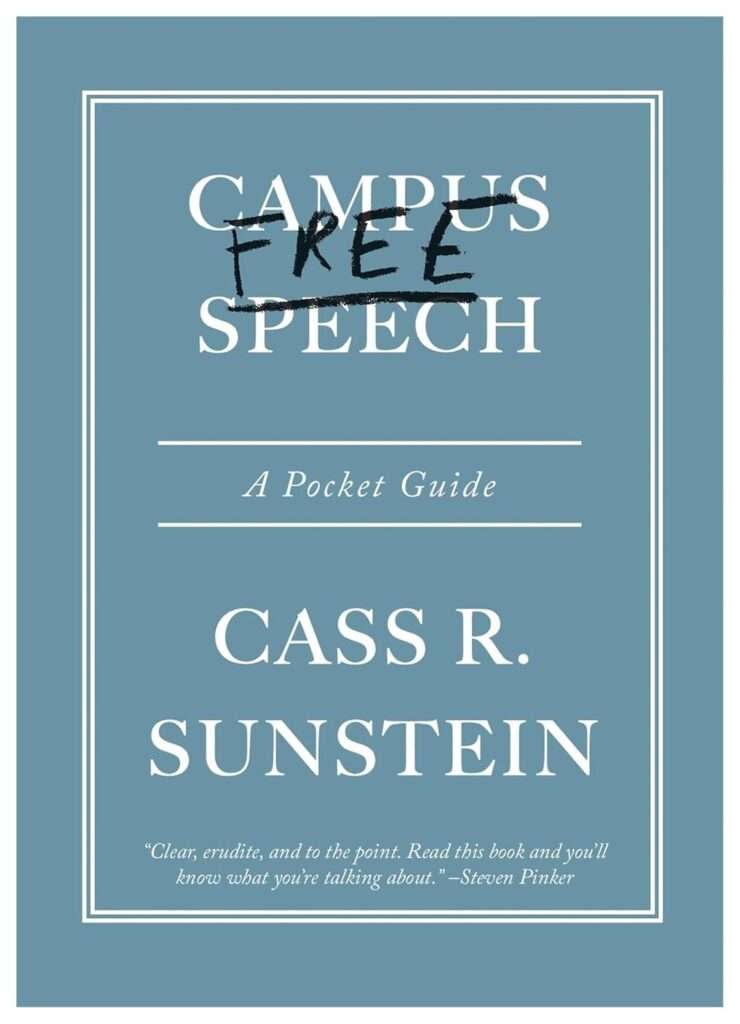
A personal confession: While I much enjoy writing, it was not a lot of fun to write parts of my new book on free speech on campus. Writing about the vicissitudes of fame or about habituation, is fun as well as intriguing; there's a lot there that's funny.
But writing about racist, sexist, and antisemitic speech doesn't exactly produce a bright smile.
Here's something that might produce, if not a smile, at least a nod: Seeing the First Amendment, in its current form, as an arms control agreement. Some people would much like to ban critical race theory on campus. Other people would like to ban teaching, or perhaps speech, that puts the United States and U.S. history in the most unfavorable light—emphasizing, for example, what might be seen as the centrality of slavery and racism.
Some people would like to ban antisemitic speech on campus. Other people would like to ban racist and sexist speech, regarding it as incompatible with the educational mission. How, it might be asked, can students learn, if they are demeaned by virtue of their skin color or their gender?
If we understand the First Amendment as an arms control agreement, we can give essentially the same answer to all these people. Properly understood, the Constitution requires all censors to lay down their arms.
Whether we are speaking of Florida or Texas, or Washington DC, or the University of California or the University of Mississippi, the First Amendment stands as a barrier. The right may be concerned with the erosion of patriotism or traditional values. The left may concerned with the maintenance of white supremacy or what is happening in the Middle East. So be it. Still, no point of view may be forbidden.
All this is a bit abstract, so let's bring it down to earth. The clearest account of the First Amendment as an arms control agreement came in 1943. That was highly improbable, because the United States was in the midst of World War II, when free speech might not be expected to have anything like a high water mark.
West Virginia State Board of Education v. Barnette raised the question whether school children could be compelled to salute the American flag—and to say the Pledge of Allegiance.
Justice Frankfurter's remarkable dissenting opinion is a good place to start. A Jew, Frankfurter began with an unusually personal word: "One who belongs to the most vilified and persecuted minority in history is not likely to be insensible to the freedoms guaranteed by our Constitution." But, he added, "as judges, we are neither Jew nor Gentile, neither Catholic nor agnostic. We owe equal attachment to the Constitution, and are equally bound by our judicial obligations whether we derive our citizenship from the earliest or the latest immigrants to these shores."
Frankfurter argued that the Supreme Court should defer to the decision of the state of West Virginia, which was to require the salute and pledge.
Writing for the Court, Justice Robert Jackson produced what is, in my view, the greatest opinion in the history of the Supreme Court. He had a lot to say about education in general: " Free public education, if faithful to the ideal of secular instruction and political neutrality, will not be partisan or enemy of any class, creed, party, or faction." The fact that boards of education "are educating the young for citizenship is reason for scrupulous protection of Constitutional freedoms of the individual, if we are not to strangle the free mind at its source and teach youth to discount important principles of our government as mere platitudes."
And Jackson ventured more broadly. "Struggles to coerce uniformity of sentiment in support of some end thought essential to their time and country have been waged by many good, as well as by evil, men." With his eye directly on Hitler and fascism, he added, "Those who begin coercive elimination of dissent soon find themselves exterminating dissenters. Compulsory unification of opinion achieves only the unanimity of the graveyard."
In his view, "the First Amendment to our Constitution was designed to avoid these ends by avoiding these beginnings."
Thus the most famous sentence in Jackson's opinion: "If there is any fixed star in our constitutional constellation, it is that no official, high or petty, can prescribe what shall be orthodox in politics, nationalism, religion, or other matters of opinion, or force citizens to confess by word or act their faith therein. If there are any circumstances which permit an exception, they do not now occur to us."
That, in short, is the arms control agreement. We should immediately note that it cannot easily be squared with the original public meaning of the First Amendment. The best historical evidence suggests that the founding generation had a much more limited understanding of freedom of speech, and that the general conception of neutrality, signaled by Jackson, emerged pretty recently.
Though traceable to the 1940s, the arms control agreement did not firm up until the 1960s. These are noteworthy facts. It is perhaps unsurprising that a robust understanding of free speech would develop during the war against fascism, and that it would be specified and concretized during the fierce debates, many of them on campus, of the 1960s.
For the current period, the lesson is not obscure. College and university administrators have been, and might be, sorely tempted to punish points of view that are inconsistent with their values and that seem beyond the pale. They should avoid that temptation. They should lay down their arms.
The post The First Amendment Is an Arms Control Agreement appeared first on Reason.com.







